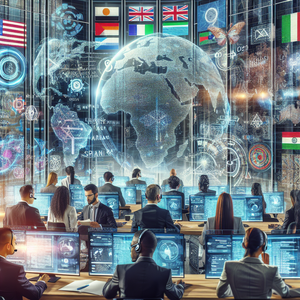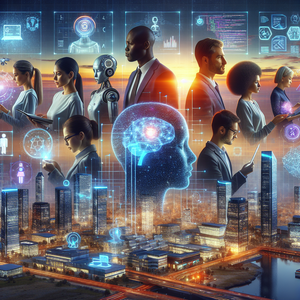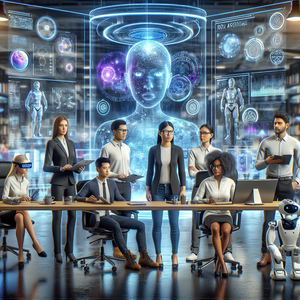
The Future of Careers in Translation and Interpretation: A Comprehensive Guide to Top Roles, Trends, and Opportunities
The translation and interpretation industry stands at a transformative crossroads, driven by technological advancements, globalization, and shifting market dynamics. While Artificial Intelligence (AI) tools like Google Translate and machine learning platforms have revolutionized aspects of language services, they have not eliminated the need for human expertise. On the contrary, professionals with linguistic skills are now more essential than ever in roles requiring cultural nuance, emotional intelligence, and specialized knowledge—particularly in fields like legal, medical, and creative work.
Job Summaries:
Translator:
- Translators transform written content from one language to another while preserving the tone, intent, and meaning of the original material.
- They work on diverse projects such as legal contracts, technical manuals, and marketing campaigns.
- The rise of post-editing machine translations (PEMT) has reshaped the role, with translators focusing on refining AI-generated text.
- Key skills include fluency in multiple languages, exceptional writing skills, and proficiency with CAT tools.
- Growth areas include legal and healthcare translation, and creative fields like publishing and advertising.
Interpreter:
- Interpreters facilitate live communication between individuals who speak different languages, often in high-pressure settings like courtrooms, hospitals, or international conferences.
- The global shift toward remote work has increased demand for video-conferencing interpreters.
- Essential skills include fluency in multiple languages, sharp listening and speaking skills, and cultural competence.
- Growth areas include telehealth interpretation, virtual event interpretation, and multilingual education services.
Localization Specialist:
- Localization specialists adapt digital content—such as websites, apps, or video games—for specific regions, ensuring cultural relevance.
- The rise of e-commerce and global digital platforms has fueled demand for localization experts.
- Key skills include strong translation abilities, cultural analysis, and technical proficiency with localization platforms and CAT tools.
- Growth areas include gaming, e-learning, and mobile applications.
Subtitler:
- Subtitlers create written translations of spoken dialogue for films, TV shows, and online videos, ensuring linguistic accuracy and perfect timing.
- The expansion of streaming platforms like Netflix has dramatically increased demand for subtitling.
- Skills required include language proficiency, attention to timing, and expertise in subtitling software.
- Growth areas are entertainment and media, particularly in regions with growing streaming audiences.
Post-Editing Machine Translator (PEMT):
- Post-editors enhance translations generated by AI, correcting errors and ensuring text meets human standards for tone, readability, and accuracy.
- As AI-powered tools evolve, PEMT has become essential for blending machine efficiency with human quality.
- Key skills include linguistic expertise, attention to detail, and familiarity with machine translation engines.
- Growth areas include legal, technical, and scientific industries where precision is critical.
Cultural Consultant:
- Cultural consultants help businesses navigate cross-cultural communication by offering insights into customs, etiquette, and cultural norms.
- The need for cultural consultancy in marketing campaigns and negotiations has skyrocketed as businesses expand globally.
- Skills required include a background in anthropology, sociology, or international relations, along with language proficiency.
- Growth areas include multinational corporations, advertising agencies, and diplomatic organizations.
Conference Interpreter:
- Conference interpreters specialize in simultaneous interpretation for events like international summits and trade shows.
- The rise of virtual and hybrid events has increased demand for interpreters on digital platforms.
- Skills include advanced degrees in interpretation, certification from organizations like AIIC, and fluency in multiple languages.
- Growth areas include diplomacy, multinational corporations, and global NGOs.
Voice Localization Specialist:
- Voice localization specialists adapt audio content for global audiences, ensuring dubbing and narration align with cultural and linguistic standards.
- The demand for localized multimedia content continues to grow, particularly in entertainment and e-learning.
- Key skills include expertise in voice acting, audio editing, and translation.
- Growth areas include gaming, streaming platforms, and online education.
The translation and interpretation industry offers a wealth of opportunities for multilingual professionals willing to adapt to new trends and technologies. Whether you’re drawn to creative pursuits like literary translation or technical roles such as PEMT, there is a place for your skills in this dynamic field. The key to success lies in embracing lifelong learning, obtaining relevant certifications, and staying open to the interplay between human expertise and AI innovation. For those with a passion for fostering cross-cultural understanding, solving complex linguistic challenges, or bringing creative works to life in new languages, the future of this industry is not only secure but full of exciting possibilities.
Explore More Jobs

